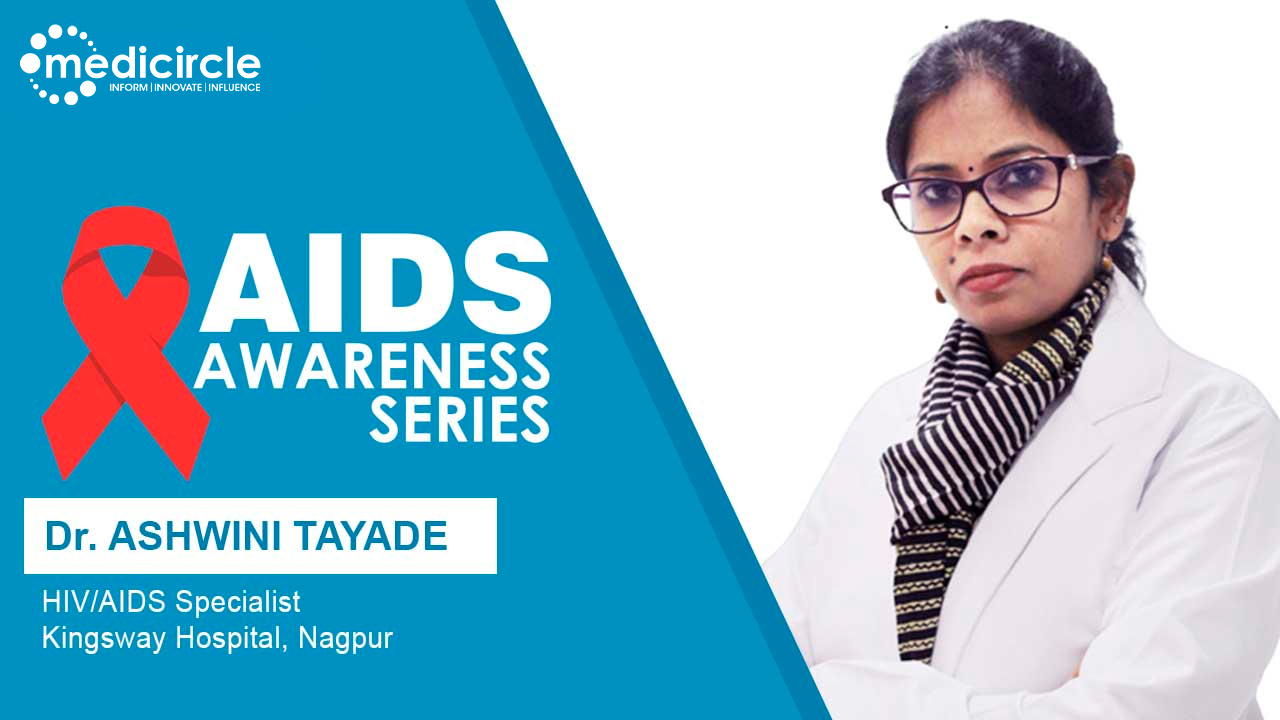Dr Ashwini Tayade is a well-known infectious disease and Adult vaccination clinic consultant in Nagpur, for the last 7 years. She is an expert in treating patients with ease and is passionate about her profession. She is a kind-hearted and gentle spokesperson not only to her patients but also to her co-members and staff. Dr Ashwini Tayade has completed her FNB ID (fellow national board) from Apollo hospital, Chennai. She has been awarded the Young Achiever Award – Vidarbha API-VAPICON 2020.
Symptoms of AIDS
Dr Tayade begins, “In AIDS, the human immunodeficiency virus (HIV) enters the body and weakens the body’s immunity. The complications created by HIV is called AIDS. There are no blatant symptoms of AIDS, as the virus is not directly affecting humans. There are 2 ways it can show itself.”
“First, when the virus enters the body one can experience symptoms of flu and viral infection. So fever, rash, sore throat and recurrent oral ulcers can be seen. Or one can see lymph nodes problems in the neck or other areas in the body. These are seen in the initial phase of the infection.”
“In the latter phase, the virus stays inside your body and weakens your immunity. When the immunity is down, then AIDS-related symptoms will appear. One can experience fever, weight loss, chronic diarrhoea, abdominal pain, cough or brain-related problems like a headache.”
Do symptoms vary with the gender?
Dr Tayade says, “There is no difference in the symptoms experienced by men and women. The only difference will be that women will be at more risk of developing cervical cancer. There would be few cancers that can be observed in women more than men. The other symptoms would be the same as the virus behaves the same in both women and men. If the father is HIV positive then he would not be able to transfer it to the child. The child can catch HIV infection only via an infected mother.”
Can HIV get cured without medical attention?
Dr Tayade explains, “It is not possible to cure HIV without medical treatment. In fact, even after receiving medical treatment, there is no cure for this. Just like diabetic patients take regular medicines, even AIDS patients need to take regular medicines. As long as you are on your medication, the virus will be suppressed. The moment you stop your medicines, the virus will start to grow.”
“As there are no direct symptoms visible, not taking medicines would not show its risk to you directly. This creates doubt in many people’s minds as without taking medicines they cannot see any problem arising. This mindset is wrong and people should know that HIV medicines should be taken regularly. Stopping this would help the virus multiply and eventually the problems will start showing itself.”
“There is a lot of stigma attached to this. So people think that now that things look normal, I should stop taking medicines. Also to get your medicines, one would have to meet a doctor and that increases the chance of disclosing your HIV status. These 2 factors hamper a person’s ability to start their treatment. People need to get out of this taboo thinking and only then we as a society will be able to control HIV infection.”
How does AIDS affect the body?
She mentions, “The infection gets transmitted from sexual activity, blood transfusion and from mother to her child. Once the virus enters the body, it starts multiplying and affecting the body’s immune system. There’s where we start checking the CD4 count.”
“In a few organs like the kidney and brain, the virus directly affects. When ART was not available, the complications seen in the brain and kidneys were very high. Earlier the ART would be given when the CD4 count has reduced. Now the guidelines advice to start the ART treatments the moment one gets diagnosed with HIV infection.”
“Depending on how much the virus has weakened one’s immunity, the infection level is based on that. When the CD4 count is less than 100, then one is vulnerable to 2-3 infections simultaneously. TB is very prevalent in India and more so for an HIV infected person. Lung, brain and stomach TB can be seen in such patients.”
“Apart from this lung infections, chronic diarrhoea and certain cancers can be seen. Cervical cancer, anal cancer, blood cancer’s incidence is high in HIV infected patients. So AIDS weakens the body’s immunity and makes the body vulnerable to chronic diseases and infections.”
Message for all
She says, “We have to come out of HIV stigma. We need to make everyone aware and comfortable to disclose their diagnosis and come for its treatments. Unless we erase this taboo and fear from society’s mindset, many will not come forward to receive their treatment. And with few people remaining untreated, the HIV infection will spread within the population.”
How to prevent HIV infection
She advises, “To prevent HIV infection, have safe sex practices and use safe injections. Pregnant women should get the diagnosis done during their pregnancy. Maintain safety to make India HIV free.”
(Edited by Priyal Shah)

 Learn about the subtle yet telling symptoms of HIV infection. Learn more about the diagnosis and the treatments with which an AIDS-infected person can live life normally.
Learn about the subtle yet telling symptoms of HIV infection. Learn more about the diagnosis and the treatments with which an AIDS-infected person can live life normally.









.jpeg)











.jpg)








